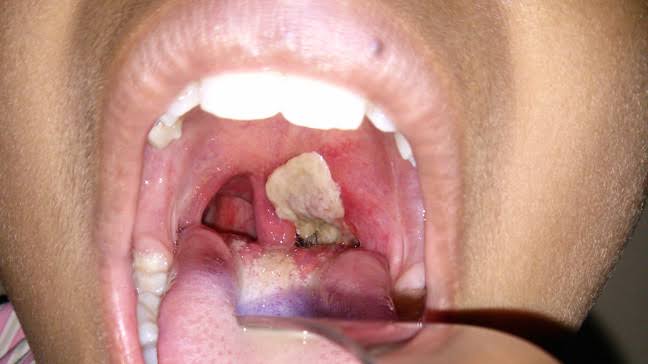

The outbreak of the diptheria disease is gradually becoming a thing of serious concern in the ocuntry and relevant government agencies need to do more to ensure that this doesn’t get to an uncontrollable state.
This is coming almost three years after the devastating outbreak of the Coronavirus in the country which claimed the lives of thousands and prompted the ordering of restriction of movements nationwide.
According to the Director General, Dr. Ifedayo Adetifa of the Nigeria Centre for Disease Control (NCDC) on Tuesday, the country, as at the last count on Monday, recorded 123 confirmed cases of diphtheria disease and 38 deaths in four states.

The breakdown revealed by the NCDC, revealed that Kano was most ravaged with 100 confirmed cases and 32 deaths; while Lagos confirmed five infections and three deaths. In Yobe, 17 confirmed cases were recorded with three fatalities, while Osun confirmed one case but no death so far.
The latest recorded number of deaths from the disease in the country, rose from 34 which was the official count on Friday,
Adetifa noted that the NCDC had asked states to heighten surveillance for diphtheria and prompt reporting, adding that it was supporting states to respond and control the spread of the outbreak, as the country has trained clinicians to promptly diagnose and contain the epidemic.

The Center also said it is providing states with antitoxins to treat confirmed diphtheria cases and had organised a workshop for laboratory scientists in states to increase diagnostic capacity for diphtheria.

Adetifa noted that diphtheria is a vaccine-preventable disease, hence Nigerians should ensure that their children are fully vaccinated against the disease with the prescribed three doses of the pentavalent vaccine.
Medical reseaechers say that Diphtheria is a serious bacterial infection that affects the mucous membranes of the throat and nose.
Although Diphtheria easily transmits from person to person, the use of vaccines can prevent the disease. If the disease is left untreated however, it can damage the kidneys, nervous system, and heart, if left untreated.
Acording to Mayo Clinic, the disease is fatal in the advanced stages of the disease and in about three percent of cases. Even with treatment, diphtheria can be deadly, especially in children.
CAUSES:
A type of bacteria called Corynebacterium diphtheriae causes diphtheria. The condition is typically spread through person-to-person contact or through contact with objects that have the bacteria on them, such as a cup or used tissue. You may also get diphtheria if you’re around an infected person when they sneeze, cough, or blow their nose.
Even if an infected person doesn’t show any signs or symptoms of diphtheria, they’re still able to transmit the bacterial infection for up to six weeks after the initial infection.
READ MORE: Kano Govt. Confirms Diphtheria Outbreak
The bacteria most commonly infect your nose and throat. Once you’re infected, the bacteria release dangerous substances called toxins which spread through your bloodstream and often cause a thick, gray coating to form in the nose, throat, tongue and airway.
In some cases, these toxins can also damage other organs, including the heart, brain, and kidneys. This can lead to potentially life-threatening complications, such as: myocarditis, or inflammation of the heart muscle, paralysis, and kidney failure.
SYMPTOMS:
Diphtheria signs and symptoms usually begin 2 to 5 days after a person becomes infected. Signs and symptoms may include: A thick, gray membrane covering the throat and tonsils; a sore throat and hoarseness; swollen glands (enlarged lymph nodes) in the neck; difficulty breathing or rapid breathing; nasal discharge; fever and chills as well as tiredness.
In some people, infection with diphtheria-causing bacteria causes only a mild illness — or no obvious signs and symptoms at all. Infected people who stay unaware of their illness are known as carriers of diphtheria. They’re called carriers because they can spread the infection without being sick themselves.
Someone with poor hygiene or who lives in a tropical area, may also develop cutaneous diphtheria, or diphtheria of the skin. Diphtheria of the skin usually causes ulcers and redness in the affected area.
PREVENTION AND TREATMENT:
Diphtheria is preventable with the use of antibiotics and vaccines. The vaccine for diphtheria is called DTaP which is usually given in a single shot along with vaccines for pertussis and tetanus. The DTaP vaccine is administered in a series of five shots.
Before antibiotics were available, diphtheria was a common illness in young children. Today, the disease is not only treatable but also preventable with a vaccine.
In rare cases, a child might have an allergic reaction to the vaccine. This can result in seizures or hives, which will later go away.
Vaccines only last for 10 years, so your child will need to be vaccinated again around age 12. Some children — such as those with epilepsy or another nervous system condition — may not be able to get the DTaP vaccine.
For adults, it’s recommended that you get a combined diphtheria-tetanus-pertussis booster shot once. Every 10 years afterward, you’ll receive the tetanus-diphtheria (Td) vaccine. Taking these steps can help prevent you or your child from getting diphtheria in the future.
With treatment, most people with diphtheria survive these complications, but recovery is often slow. Diphtheria is fatal about 5% to 10% of the time. Rates of death are higher in children under age 5 or adults older than age 40.
SOURCES: Healthline and Mayo Clinic









